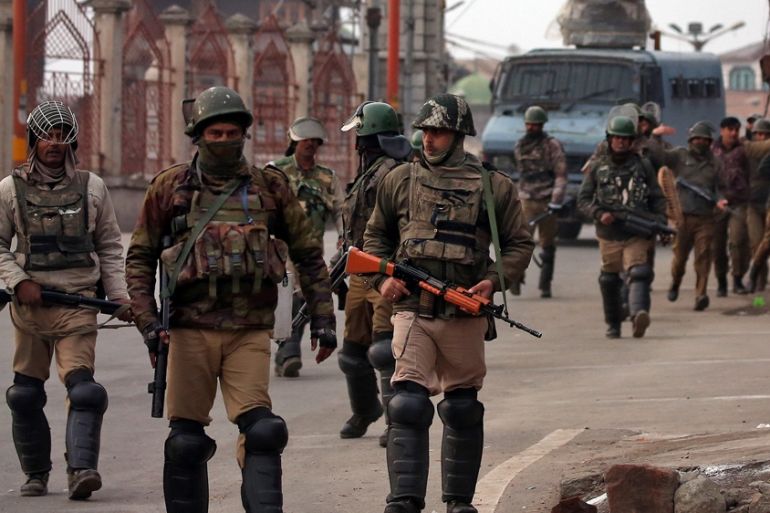India police arrest Kashmir separatists amid rising tensions
Nearly 150 separatists arrested in a crackdown that follows the worst suicide attack in the disputed region last week.

Police have arrested at least 150 separatists in India-administered Kashmir, officials said, escalating fears among residents that a sweeping crackdown could touch off renewed anti-India protests and clashes.
The crackdown that began on Friday night came amid high tensions between India and Pakistan following the February 14 suicide car bombing of a paramilitary convoy by a Kashmiri rebel.
Forty-two Indian soldiers died in the suicide blast in south Kashmir’s Pulwama district, the worst such attack against Indian government forces in the region’s history.
India blamed Pakistan for the attack and promised a “jaw-breaking response”.
Police on Saturday said they went to neighbourhoods overnight and rounded up top leaders and activists of mainly Jamaat-e-Islami, a political-religious group that espouses the right to self-determination for Kashmir.
The raids and arrests continued on Saturday.
Among those arrested were Jamaat-e-Islami’s regional head Abdul Hamid Fayaz, and Mohammed Yasin Malik, an influential pro-independence leader who heads the Jammu-Kashmir Liberation Front.
Malik was picked up from his home late on Friday night in the region’s main city of Srinagar, where most shops and businesses closed impromptu on Saturday to protest the crackdown.
![Demonstrators in Ahmedabad demanding to scrap Article 370, a constitutional provision that grants Kashmir special status and allows the state to make its own laws [Amit Dave/Reuters]](/wp-content/uploads/2019/02/07587cebd7574f099e51086862a027e4_18.jpeg)
‘Illegal, coercive’
The arrests drew widespread criticism from Kashmiri political leaders.
“Fail to understand such an arbitrary move which will only precipitate matters,” Mehbooba Mufti, former chief minister of Jammu and Kashmir state said on Twitter.
“You can imprison a person, but not his ideas.”
“Such illegal and coercive measures against Kashmiris are futile and will not change realities on the ground,” said Mirwaiz Umar Farooq, an influential separatist leader.
A Joint Resistance Leadership, comprised of three top Kashmiri leaders including Malik, has called for a strike on Sunday to protest against the crackdown, a statement said.
Through Friday night and Saturday, Indian fighter aircraft and military helicopters hovered above the Himalayan region.
Indian authorities on Saturday also rushed about 10,000 additional paramilitary soldiers to Kashmir Valley, already the world’s most militarised region.
Residents fear the crackdown could be a prelude to a military strike by India against Pakistan or the tinkering of Kashmir’s special status in India’s constitution.
India’s Supreme Court has yet to give its verdict on a petition challenging a special provision that it has been hearing for more than a year.
A hearing on the provision, which gives Kashmiris special rights to property and jobs in the disputed territory, is expected in the Supreme Court on Monday.
![Indian Central Reserve Police Force personnel stands guard in front of closed shops next to the Jamai Masjid in Srinagar [Danish Ismail/Reuters]](/wp-content/uploads/2019/02/4d88ab63b691412e831229ebff1f0c6a_18.jpeg)
Panic in the region
Meanwhile, the arrests, the military clampdown and the government’s threats against Pakistan prompted panic buying of fuel, medicines and food in the region.
There were queues outside petrol pumps and grocery stores were packed with people stockpiling food.
“People are buying rice, edible oil, pulses, eggs and other essentials in bulk. We are busy and supplies are running out,” said Mohammad Amin Rather, owner of a grocery store in Rajbagh area of Srinagar.
A government directive to hospitals to ensure they have stores of drugs triggered some of the concerns.
“People in the valley, especially the cities and towns, are taking everything said or done as a sign that some big trouble is just around the corner,” said Omar Abdullah, a former chief minister of Jammu and Kashmir.
Election issue
Kashmir is likely to be a key issue in the Indian general election, due in April and May.
The tension in Kashmir has taken some of the attention away from concerns about the way Prime Minister Narendra Modi and his Bharatiya Janata Party have managed the Indian economy, and issues such as weak farm incomes and poor jobs growth.
Modi has promised a strong response to the Pulwama attack and on Saturday reiterated his intention to make the perpetrators pay a heavy price.
However, he did condemn the harassment of Kashmiris that has occurred in various parts of India since the attack.
“Our fight is for Kashmir, not against Kashmiris,” he told a rally of supporters. “Kashmiris have suffered the most due to terrorism, and the rest of the country must stand in their support.”
Since 1989, rebels have been fighting against the Indian rule in Kashmir. About 70,000 people have been killed in the uprising and ensuing crackdown.
The Himalayan territory of Kashmir is divided between India and Pakistan, but claimed by both the nuclear powers in its entirety. The two nations have fought three of their four wars over the disputed region.
Most Kashmiris support the rebels’ demand that the territory be either merged with Pakistan or declared independent, while also participating in civilian street protests against the Indian administration.